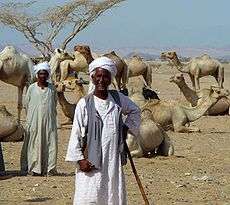Jellabiya

The jellabiya (Arabic: جلابية / ALA-LC: jilabīyah or gal(l)abeyya Egyptian Arabic: [ɡæ.lɐ.ˈbej.jɐ, ɡæl.lɐ-]; "jelabiyad" in Somalia; "jelebeeya" in Ethiopia; "jehllubeeya" in Eritrea) is a traditional Sudanese and Egyptian garment native to the Nile Valley.

It differs from the Arabian thawb in that it has a wider cut, no collar (in some case no buttons) and longer, wider sleeves. In case of farmers, these sleeves can be very wide and sewn into pockets. They are then used to store small items such as tobacco or money. Along the Red Sea coast of Sudan and Egypt as well as the Sinai peninsula, most Arab Bedouin and some Badawi tribesmen prefer the Arabian style dishdash or thawb over the Nile Valley jellabiya because of the latter's association with farming.
Jellabiya colours are often white in the summer. During winter, thicker fabric in other colours such as grey, dark green, olive, blue, tan or striped fabrics are used and colourful scarves worn around the neck. The garment is traditionally worn with an ammama (Arabic: عمامة; Egyptian Arabic: عمة IPA: [ˈʕemːɐ]) (turban).